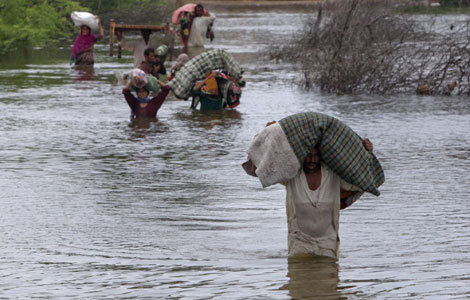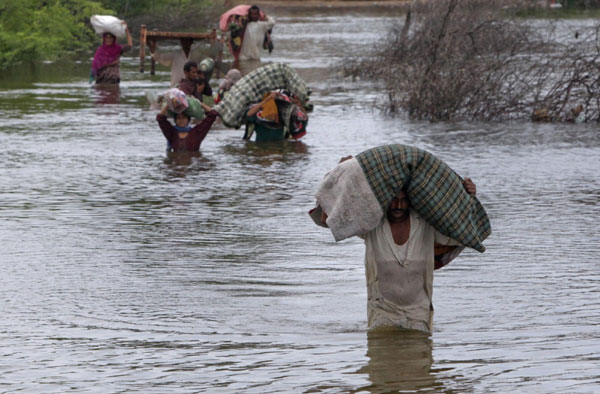Floods rattle Pakistan, 300,000 homeless
Updated: 2011-09-14 09:58
(Agencies)
|
|||||||||||
KARACHI/BADIN, Pakistan - Monsoon rain crippled Pakistan's biggest city Karachi on Tuesday, and the unpopular government came under pressure to provide relief for about 300,000 people left homeless by floods in the south.
Pakistan, regarded as one of the world's most unstable countries, is haunted by memories of epic floods last year, which brought widespread criticism of the government because of its slow response.
More than 800,000 families remain without permanent shelter from the 2010 country-wide floods, aid groups say, and more than a million need food assistance.
Pakistani leaders face a new crisis as monsoon rains which have killed 226 people sweep through the southern province of Sindh.
Flood waters have destroyed or damaged 1.2 million houses and flooded 4.5 million acres (1.8 million hectares) since late August, disaster management officials and Western aid groups say.
In Karachi, the capital of Sindh, few people made it to work or school and more rain forecast through Wednesday raised the possibility of extended disruptions.
Many streets were impassable, cars were stuck and several fuel stations were inundated.
"We have recorded 50-100 mm (2 to 4 inches) of rain in Karachi and the situation is pretty bad. It can turn even worse," said Mohammad Hussain Syed, the city's district coordination officer.
He said no casualties had been recorded.
Many banks were also closed in Karachi, Pakistan's economic engine.
"I thought I would be able to make it to work, but it was a wrong decision. Now I am stuck. My car has broken down and I can't even find anyone for help," said banker Khalid Hussain, standing knee-deep in water.
STRANDED AND ANGRY WITH THE GOVERNMENT
In the countryside, flood victims condemned the government, echoing sentiment during last year's disaster.
"We are on our own. I don't know how we are going to survive," said Mala Badal, who took refuge with 800 others in a school that is serving as a shelter in Tando Adam village.
She and her fever-stricken baby who constantly moaned in pain spent Monday night in the shed of a grocery shop as heavy rain pounded the area.
Near the town of Badin, 65-year-old Bani and hundreds of others built shelters from branches, sheets and plastic as goats roamed nearby.
The floods took many by surprise.
"Everything we have is destroyed. Our landlords gave us food but not the government," said Bani.
"When the water came we just grabbed a few belongings, anything we could carry, like the beds. We have just the clothes we are wearing."
Monsoon rains sweep the subcontinent from June to September and are crucial for agriculture.
Officials said they were doing their best to help people.
"In many areas the flooding has completely cut off villages. So we can't even reach those people. We have asked the army's engineering corps to help move these people," Sindh Minister for Rehabilitation Muzafar Ali Shujra told Reuters.
The 2010 floods killed about 2,000 people and made 11 million homeless in one of Pakistan's worst natural disasters. While the government was seen as indecisive, the military took charge of rescue and relief efforts.
One-fifth of Pakistan was then submerged in water -- an area the size of Italy -- and the government faced a $10 billion bill to repair damage to homes, bridges, roads and other infrastructure.
Aid workers expressed fears over possible outbreaks of diseases linked to the new floods, especially among children.
Karachi, on the Arabian Sea and the country's main port, contributes about two-third of the government's total tax revenue and 25 percent of Pakistan's gross domestic product.
Floods are the last thing the city of 18 million people needs.
Political and ethnic violence, organised crime, drug gangs and Muslim militancy have destabilised Karachi, prompting recent calls for a military crackdown.
The Islamabad government, reliant on an $11 billion IMF loan to keep the economy afloat, will face another setback if floods cause heavy damage to the vital agriculture sector.
Floods have caused only minor damage to the sugarcane and rice crops, officials said, though weeks of downpours have already destroyed about 13 percent of the crucial cotton crop.
Hot Topics
Organ transplant bonds mother and son
Editor's Picks

|

|

|

|

|

|








